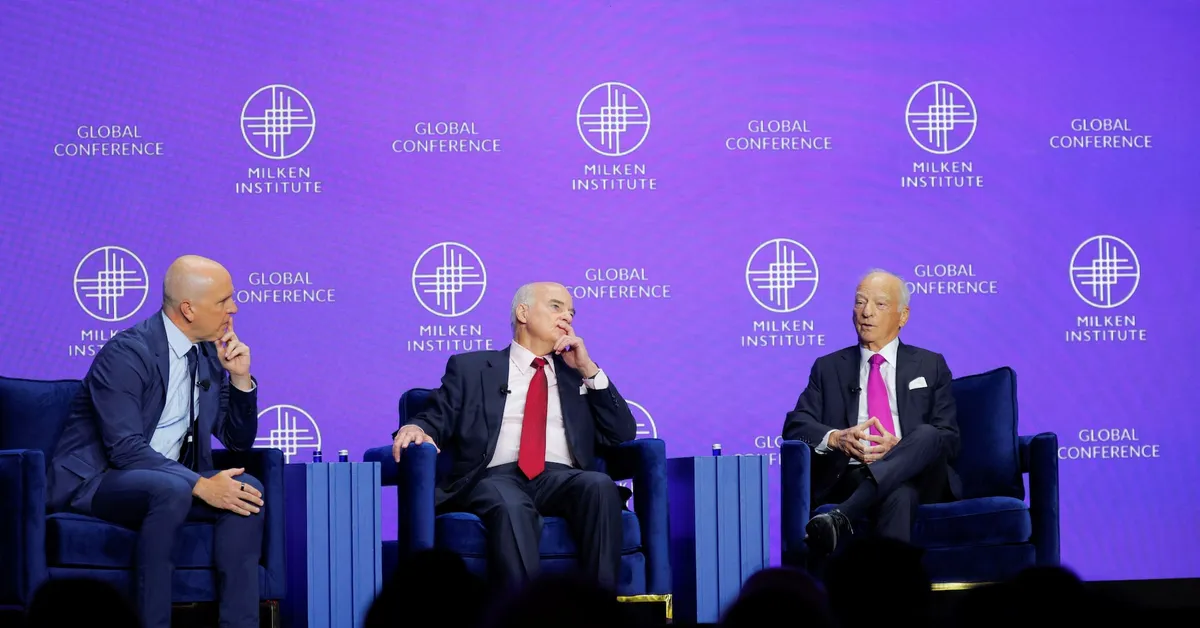
On May 5, 2023, in Beverly Hills, Wall Street's top executives and dealmakers gathered for the Milken Institute Global Conference. This high-profile event aimed to project a sense of calm amid growing fears of an economic slowdown driven by President Donald Trump's trade policies. Investment managers and bankers at the conference voiced their concerns over the impact of Trump's aggressive tariffs on imports from key U.S. trade partners, which have led many companies to reconsider their investment plans and increased risks associated with U.S. assets. This uncertainty was highlighted by a brief but sharp selloff in U.S. stocks.
Despite the challenges posed by the current economic climate, many executives remained cautiously optimistic about the U.S. economic outlook. Harvey Schwartz, CEO of global investment firm Carlyle, acknowledged the situation as a "period of uncertainty," yet emphasized that investors are eager to engage in the market. "The risk premium is definitely higher, but people want to engage. We are actively looking for opportunities," Schwartz stated, illustrating the complex balance between caution and opportunity in today’s investment landscape.
Since Trump's return to office, his fluctuating tariff announcements have created turbulence in financial markets, resulting in significant stock losses and fears of capital outflows from the U.S. As investors scramble for assets less vulnerable to Trump's unpredictable policy shifts, the risks of a global recession loom large. A recent Reuters poll revealed that 92% of economists believe Trump's tariffs have negatively impacted business sentiment, marking a stark change from just three months earlier when the same group predicted robust global economic growth.
Many attendees of the Milken conference expressed hope that a recent shift toward a softer stance on tariffs from both Trump and Treasury Secretary Scott Bessent might mitigate the economic slump caused by the administration's trade policies. Bessent reassured attendees that Trump's economic agenda—comprising trade, tax cuts, and deregulation—is designed to drive long-term investment in the American economy. "Betting against the American economy is a time-tested mistake," he asserted, highlighting the resilience of the U.S. market.
As investors await clarity regarding the final composition of tariffs, many are adopting a cautious approach to their investment strategies. Citigroup CEO Jane Fraser noted, "What we're hearing from clients is they're prepping for headwinds. They're holding off on investment spending." This cautious sentiment is echoed by a senior executive from a large overseas company, who expressed concerns about the impact of U.S. trade policies on growth and inflation.
Despite the prevailing uncertainty, some investors are finding silver linings in the market's fluctuations. One prominent hedge fund manager, whose fund rebounded after earlier losses, suggested that concerns about a recession may be exaggerated. Gautam Bhandari, global chief investment officer at I Squared Capital, pointed out that delays in capital expenditure decisions among large firms are creating opportunities for smaller players. "For private capital in the middle market, this is an opportunity," he remarked, indicating a potential shift toward a more industrialized economy.
Throughout the Milken Institute Global Conference, top executives from leading banks and investment firms mingled with government representatives, reinforcing the message that America remains a premier destination for capital investment. Waleed Al Mokarrab Al Muhairi, deputy group CEO at Mubadala Investment Company, emphasized that they have not halted their capital deployment, stating, "We’re looking, we’re assessing, we’re figuring things out." With 42% of its portfolios invested in the United States, Mubadala continues to see value in the U.S. market.
As the conference concluded, the prevailing sentiment among attendees was one of resilience and cautious optimism. Despite the challenges posed by Trump’s trade policies, the U.S. economy continues to present significant opportunities for investors willing to navigate the complexities of the current landscape.